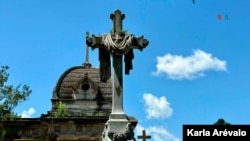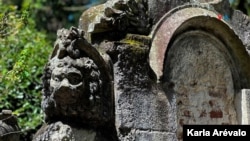Destroyed tombstones, bones out of their niches, stolen crosses and accumulated garbage are some of the images seen in the general cemetery of Guatemala City, which has been vandalized by criminals and organized crime in that country.
Some gravediggers say that criminals desecrate the tombs with the intention of stealing valuable objects such as jewellery, bronze and marble, the latter used to make new tombstones.
Several of the mausoleums have broken glass windows and forced-open doors with the padlocks protecting them torn off.
Furthermore, there are no security personnel in the vicinity of the cemetery, except at the entrance where there is an administrative office.
The cemetery is located on the edge of a ravine, where the threat of several niches collapsing is latent, and where several graffiti with signs alluding to gangs can also be seen, mainly to Mara Salvatrucha and Barrio 18, two groups with dominance in several departments of that country.
It is from this ravine that locals claim that gang members and other criminals enter the cemetery to desecrate the graves. Not everyone goes to the last alley with graves, for fear of being assaulted.
The maras are a cross-border phenomenon that grew after the mass deportation of thousands of Central Americans living in the United States in the 1980s. Upon returning to their countries of origin such as Guatemala, Honduras and El Salvador, they quickly organized.
Although extortion is one of the most profitable crimes for the gang, they are now known to be involved in more sophisticated transnational activities as well.
Almost half a year after assuming the presidency of Guatemala, Bernardo Arévalo acknowledged that there are communities in the Central American country that are prisoners of these groups. But his strategy, unlike that of El Salvador, is based on containing illegal activity in prisons.
Guatemala has made it clear that it will not impose a state of emergency like its neighbor El Salvador, which declared a national emergency in March 2022 due to gang violence. Meanwhile, gangs in Guatemala are diversifying their criminal activities.
According to local press, the General Cemetery in Guatemala is not the only cemetery desecrated by this and other groups affiliated with witchcraft.
In Chinautla, one of the municipalities of Guatemala, around 51 tombs were also looted in 2023, According to local media Prensa Libre.
In addition to stealing metals and other objects, the criminals also took the limbs of one of the dead.
Under Guatemalan law, desecrating a grave is a crime punishable by imprisonment ranging from six months to two years.
The Guatemalan Attorney General’s Office has recorded more than 450 reports of grave desecration since 2012. Despite the warning, some cemeteries continue to be looted.
The general cemetery of Guatemala City was built in 1880, and its first burial occurred in 1881. Among the former governors who are in the cemetery are Justo Rufino Barrios, who ordered the construction of this cemetery, and Carlos Castillo Armas.
For the administration of the place, the Guatemalan government has allocated in its budget 24 million quetzalesthat is, 3.1 million dollars annually.
Connect with the Voice of America! Subscribe to our channels YouTube, WhatsApp and to newsletter. Turn on notifications and follow us on Facebook, X and Instagram.


![[Img #74664]](https://thelatestnews.world/wp-content/uploads/2024/12/James-Watson-The-controversial-genius-behind-the-double-helix-150x150.jpg)













Add Comment